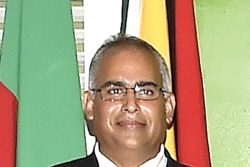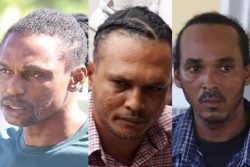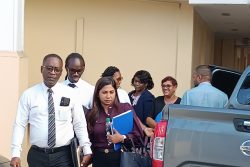Friday was International Democracy Day which brought in its train the expected commentary from government on the five months’ suspension of democratic norms here some three years ago. That was a clear-cut case of an attempt to falsify the election results, which fortunately failed. Since we have now surmounted this aberration something else has been emerging, and that is the great conceptual divide about the nature of democracy in this country. It has been underlined by was what was said in the run-up to that day by both President Irfaan Ali and Vice-President Bharrat Jagdeo, ranging them against the opposition as well as independent critics. It is a divide which has implications for the future political evolution of this country, and the kind of framework within which we seek to give expression to our notions of freedom.
The government has committed itself to reform of the constitution, but has proved very dilatory in getting the process underway. The implication is that it is in no hurry for change where that is concerned, and at the moment it is in any case in breach of our existing fundamental charter, not just in terms of its spirit but also its letter. This newspaper’s editorial of Monday last made reference to President Ali’s dereliction in relation to the substantive appointments of a Chancellor and Chief Justice, which have come “in the wake of a compromise offer by the Leader of the Opposition Aubrey Norton and a ruling of the High Court [four months ago] that these appointments be made speedily.”
Under the constitution the President is required to consult with the Leader of the Opposition to make these appointments, and it is clear he is not prepared to confirm the current acting incumbents in their posts or consult about alternatives with Mr Norton. He therefore follows the route of violating the constitution, and in a press conference last Saturday advanced fictitious excuses for his evasion of his duty. Either he does not understand the constitution, which would be a serious comment on his competence as head of state, or he intends to ignore it, which has more sinister implications.
Whatever the case, this example is symptomatic of an underlying problem that has been raised before, but which in the last two weeks has been given explicit expression at the highest levels of government. It is the question of ‘inclusion’ in government, as advocated in the constitution, which also specifies some mechanisms – including consultation with the opposition over certain appointments – by which this can be effected. The Vice-President appears uncompromising about not consulting the opposition, being quoted by the state newspaper in response to a letter from Mr Vincent Alexander as saying: “Now, clearly, if you look at this, you will see a pattern of behaviour and this is to justify an engagement where President Ali must meet with the PNC or the opposition because somehow if he doesn’t meet with the opposition, Afro-Guyanese interests cannot be accommodated in this government, which is false narrative.”
His reason, apparently was stated subsequently in the form: “Today, we’re not going to allow them [APNU] to be the voice of democracy; they can never be the voice of freedom or democracy.”
Mr Alexander is not unknown for his tendentious utterances, but on this occasion he had a valid observation to make, namely that the election which allowed the PPP/C to take up government, also vested in “the APNU+AFC the right to occupy the seat of Opposition and the right to participate in Governance.” It was therefore incumbent on the government to act in accordance with the constitution as regards the rights of the opposition.
Of course, Mr Jagdeo expanded on the theme of how much the government had accomplished for African Guyanese as well as all the other groups in comparison with the record of the PNC and the coalition. But even if all of that were true, it is to miss the point. In a representative system which is what obtains here, our constitution requires inclusivity not in terms of race, but in terms of political parties. While our two major parties are ethnically based, in constitutional terms the word ‘opposition’ is not interchangeable with any given racial group. That said, since the core constituency of the parties has an ethnic character, it is by implication to insult the choice of whichever is in opposition if their representatives are bypassed as a matter of principle.
President Ali, who is the one on whom the onus of consultation with the opposition falls under the constitution, in a press conference last Saturday was adamant that he had fulfilled his constitutional obligations in this regard, and had reached out to the Leader of the Opposition formally eight times between April 2022 and June 2023. “[Y]ou would not find me wanting when it comes to fulfilling my constitutional mandate because I believe strongly in constitutional rule, and upkeeping the Constitution of our country,” he averred. Not where the appointment of the Chancellor and Chief Justice is concerned, it might be remarked.
That aside, Mr Norton responded, “That is not true.” He said that if there were eight letters these would relate to the Public Service Commission and Teaching Service Commission, nothing else, and he challenged the President to produce the correspondence to support his contention. When reporters requested information as to when the letters were sent, President Ali said he could not remember, but would have his office share them. On the subject of whether he would formally write Mr Norton to have dialogue he responded that he did not see why he should, and that the Opposition Leader should now be the one to reach out. “As I have said … what stops him from calling?” he asked.
This somewhat surprising. He should be aware that as head of state he is the one to issue the invitation for consultation since he is the one, not the Opposition Leader, who is empowered to make the appointments. But it was not just his ignorance of the protocols which caught observers off guard, it was also the fact that he asked what it was he would need to write Mr Norton about. “On what?” he was quoted as enquiring. When he was told there were a range of issues, he replied, “I don’t know if the Leader of the Opposition gave you a list, but I can say to you I don’t know. I can’t speak in abstract. On all the dialogue that deals with the constitution, I have executed my mandate.” It can only be suggested that his AG hold a session with him and perhaps his Vice-President as well on what it is that the constitution requires.
As for how President Ali, and by extension Mr Jagdeo, interpret the question of inclusion in the constitution, the former was quite explicit: “Since assuming office, I have conducted hundreds of outreaches myself … and Cabinet has conducted thousands of outreaches all across the country, directly communicating to the people and listening to them. That is what inclusionary democracy is about. That is the hallmark, when the ideas of the common man, when the voice of the common man finds itself in the discussion of the Cabinet of the country, when the ideas of the common man, when the ideas of the people in society shape the policy formulation of the country, influences the policy formulation of the country. That is what inclusionary democracy is,” he said. Not in the Constitution of Guyana, it isn’t, although there is nothing preventing a president from talking to people all across the land and finding out about their problems and their opinions. But that is an informal arrangement. The “common man” (and woman, presumably) will have no avenue for ensuring their views are taken into account by government, or feed into a policy, or are followed by an appointment they favour. In such a scenario where an opposition has no role, an administration is answerable to nobody and can take on an autocratic flavour. And it is not just in the matter of consultations the government is in default; even in Parliament in relation to referring important legislation to Select Committee, for example, it has a habit of bypassing this stage and using its majority to rush through Bills. It gives the appearance of going to some lengths to avoid discussing with the opposition in all contexts.
While the President at his media briefing also gave an exhaustive list of the people with whom he had ‘consulted’, the public has noticed that apart from the opposition, there are certain ordinary citizens with whom he doesn’t consult either. These fall into the general category of critics, who are systematically denigrated and maligned. Although the talk is about inclusion with the ‘common man’, that does not encompass everybody. What the government wants is to be able to carry through its agenda without criticism or questions from any source. They have created an excuse for not consulting the opposition (it is not democratic) and anyone else they perceive as opposing them they accuse of trying to obstruct Guyana’s development.
A lot has been written about the need to amend the constitution to make it more inclusive. It can only be said that since the government has so distorted the intent of inclusion in the present constitution, and has violated it without any consequences, a more inclusive document would be unlikely to change their vision of how our democracy should function in the immediate future. They may be able to work the way they have been doing in the shorter term, but in the longer term there are likely to be changes – demographic or relating to opposition personality changes or occurrences which cannot be predicted – which may require them to reflect on the folly of their present approach to democratic questions and their disrespect for the constitution.






